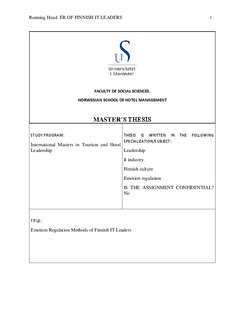Emotion regulation methods of Finnish IT leaders
Master thesis
Permanent lenke
http://hdl.handle.net/11250/301349Utgivelsesdato
2015-06Metadata
Vis full innførselSamlinger
- Studentoppgaver (SV-NHS) [618]
Sammendrag
The purpose of this study is to examine what emotion regulation (ER) techniques Finnish IT industry leaders use when faced with stressful and demanding leadership responsibilities and requirements at work. This study has a qualitative research design. A combination of snowball sampling and sequential sampling methods was applied. New interviewees were added up to saturation (n+1), and a total of eight Finnish IT- leaders were interviewed in Finland in 2015 through semi-structured interviews that were recorded, and transcribed verbatim. Country Legislation and culture play big roles in forming leadership requirements and behavior, hence affecting the entire work environment and culture. Finnish IT leaders use a great variety of ER strategies at work depending on the situation at hand, including reappraisal, deep acting, surface acting, suppression, displaying naturally felt emotions, but also cognitive and physical strategies, e.g. prayer, self-reflection, sports, and music. Even if leaders are expected to be honest and to show their emotions, this needs to be done in a constructive way, concentrating on work related goals. None of the respondents reported using mindfulness and the likes as means to cope with stress, or in order to better themselves in ER tactics. Finnish leaders could benefit from further training in emotional intelligence and ER, benefiting themselves as well as improving employee satisfaction and the work environment. Further studies on ER in connection to meditation, prayer and spirituality in a leadership context could be conducted. Participant and observer biases might have affected the study results, as well the fact that research was carried out by a single individual. This study could be replicated by using both qualitative and quantitative research methods, both in Finland and abroad.
Beskrivelse
Master's thesis in International hotel and tourism management
